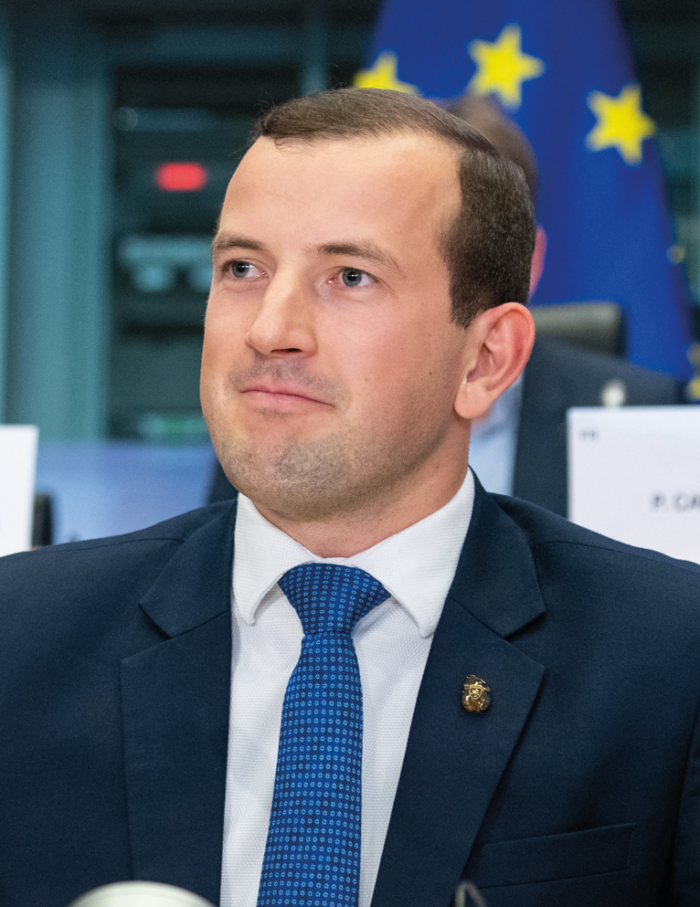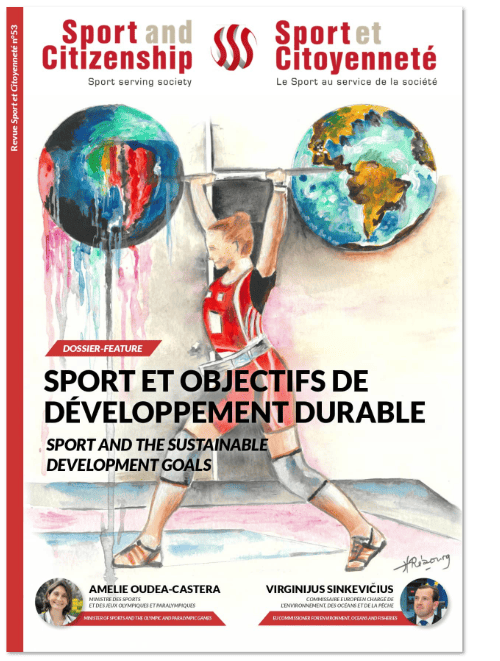“Sport can be an important driver for positive change”
The European Union (EU) aims to be the first climate neutral continent. To meet this challenge, the EU has set out its European Green Deal, a set of proposals to make the EU’s climate, energy, transport and taxation policies fit to end net emissions of greenhouse gases by 2050. Virginijus Sinkevičius, EU Commissioner for Environment, Oceans and Fisheries, explains what is at stake and how sport can contribute to achieving the targets.
 Can you remind us what the European Green Deal is?
Can you remind us what the European Green Deal is?
VS: The European Green Deal is the EU’s systemic response to the planetary crises fuelled by our unsustainable use of the Earth’s resources. Climate change, pollution and biodiversity loss are getting worse by the day, and they already affect hundreds of millions of people, so there is no time to waste.
With the Green Deal, we want to make our economies and societies more sustainable, resilient, and future-proof. We aim for a carbon-neutral continent by 2050, with no loss of nature, pollution at levels no longer harmful for people and ecosystems, and circularity in resource use as the new industrial norm.
Sport has an impact on the environment. It also suffers from the effects of climate change. How do you think sport can contribute to achieving the objectives of the European Green Deal?
VS: One central goal in the Green Deal is reducing CO2 emissions by 55% by 2030, compared to 1990. This can only be achieved if all economic and societal actors contribute. The sport sector is no exception.
Like other human activities, sport-related activities have a considerable impact on the environment, climate and biodiversity. The means of transport we use as fans or athletes, the production and consumption of sports equipment or derived goods and services, sports facilities, the increasing number of sports events – these are just some areas where the sector must be part of a wider shift towards a more sustainable future.
At the same time, sport plays such an important role in the lives of many citizens and brings huge benefits: for health, physical and mental well-being; for social cohesion; and for the economy. It is perhaps the human activity with the strongest potential of showcasing exemplary behavior, allowing the involvement of all, particularly of young people as actors of change.
Are there some actions that are already being implemented?
VS: Various actions are carried out. The Commission is coordinating the work of the Green Sport Expert Group. Member States work together with the sport sector on recommendations for greener sports. Their work covers sustainable sport infrastructure and events as well as innovative solutions, capacity-building, education and sport’s contribution to the European climate pact.
Another initiative is “HealthyLifeStyle4All”, which promotes a healthy life style across generations via a pledge to support active lifestyle by developing the European Air Quality Index mobile app. The app provides up-to date, reliable and comparable air quality data across the EU and straightforward health recommendations that help users plan their outdoor activities. The Commission has also launched a pilot project called “Sport for People and Planet – a new approach on sustainability through sport in Europe”.
Your responsibilities include drafting a new biodiversity strategy for 2030 and a circular economy action plan. Will the sport sector be included in your reflections?
VS: The Biodiversity Strategy for 2030 and the Circular Economy Action Plan don’t specifically mention the sports sector. However, the Circular Economy Action Plan encompasses all economic sectors, with the aim to shift the European economy towards a regenerative growth model. We want to mainstream circular economy principles in the current production and consumption processes and models, which include the sports products and services sector. An EU Strategy for Sustainable and Circular Textiles was launched in March 2022, which also concerns the sports sector and sports equipment.
As part of the Biodiversity Strategy, our recent Nature Restoration Law will have a positive impact on the sport sector, especially outdoor sports. With this new proposal, we want to bring nature back and restore all degraded European ecosystems to good health. A special target concerns urban ecosystems – a positive thing for nature, but also for people enjoying outdoor activities.
Concerning the circular economy, solutions are emerging in terms of the reuse of sport equipment. What would be your opinion on such initiatives?
VS: We welcome and encourage all efforts to reuse products such as sport equipment, as it is perfectly in line with the circular economy principles. Initiatives built to recycle, repurpose and reuse sports gear and therefore working towards zero waste in the sector, such as the ones in France and other EU countries, are a perfect example of a grassroot uptake of circular economy principles. The Circular Economy Action Plan reflects the need to switch to a new production and a new consumption model, which in turn create potential and opportunities for new business models with the ideas of renting and repairing as their base.
Furthermore, the EU waste legislation already obliges Member States to stimulate the re-use of products and the setting up of systems promoting repair and re-use activities, in particular for textiles. This means that producers and consumers both have to adopt the principles of reuse, recycling, maintenance and repairing.
On April 4th, the EU Sport Council adopted conclusions entitled “Sport and physical activity as promising levers for changing behaviour in favour of sustainable development”. What could be their significance for the European Commission in the coming years?
VS: As world leaders in sustainability, the EU and its Member States can really set an example in reducing the environmental impact of sports. We will continue with our work on integrating the sports dimension in the Green Deal. We also look forward to continuing our cooperation with the Czech Presidency of the Council of the European Union, which will focus on sustainable and accessible sport infrastructure.
Every area of human activity has to rethink and reduce its environmental impact and sport can be such an important driver of positive change. I appreciate that the Council also highlights the huge engagement and education potential of sports – for example through the athletes seen as role models by many. By showing the right example and advocating for sustainable choices, famous athletes and the sport sector can contribute to this much-needed behavior change.
Interview by Laurent Thieule
Find this article and more in our special magazine “Sport and ODD”!







 INSCRIPTION
INSCRIPTION
 CONTACT
CONTACT FACEBOOK
FACEBOOK